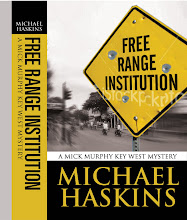I am up early each morning, to the chagrin of Celine, and usually switch the TV news shows between the local ABC and Fox news programs. I am most interested in the expected weather conditions and both stations give predictions for Key West, even though the stations are in Miami or thereabouts.
I’ve been involved in journalism most of my life and, unlike fiction, journalists have stylebooks that give rules on writing. I used the AP Style Book in Boston and, again, years later, in Key West.
What does early morning TV and AP Stylebooks have to do with one another? I’m glad you asked. On both TV stations, the weather person and traffic reports use the word “towards.”
“The storm is moving towards Miami.”
“The traffic has stalled north bound towards the 95 from the interchange.”
Wondering what’s wrong? I think most people would because, more and more, I hear people using “towards” in conversations.
I wrote a business story a long time ago and the editor at the Key West Citizen, Bernie Hunt, pointed out to me that in American English there ain’t no such word as “towards.”
“It’s a British usage,” he told me and, being an Irishman who grew up outside London, Bernie would know. He also was part of the news team in San Diego, California, who won the Pulitzer for newspaper coverage of a commercial airliner that crashed at the city’s airport.
Since then, whenever I hear someone on the TV news use “towards,” I cringe. Shouldn’t the electric media know better?
It doesn’t end there. The word “over” is another misused word that drives me crazy and this one, I admit, I regularly abused. That is, until copy editor Van Trotter explained the correct used of “over” and “more than.” We were at the Green Parrot Bar on Whitehead Street, a couple of blocks from Ernest Hemingway’s home. A journalism background didn’t hurt Hemingway’s writing and, some would say, it helped him form his unique style.
Somehow, Van and I got to talking about work and he told me every time he drives by a MacDonald’s he goes crazy when he sees the golden arches and the words: over a billion sold (maybe it says 10 billion, but you get my point).
“Over!” Van said, or maybe even yelled and scared some of the late-night drinkers (this was after we put the paper to bed at 11 p.m.). “The cat jumped over the moon, is right, but over a billion sold, is wrong!”
So, what’s the right way? “More than a billion sold,” he said. “If it involves math, numbers, comparison, it’s ‘more than’ not over. Numbers don’t jump over things.”
The AP Stylebook has pages and pages of correct usages for newspapers. So why, as mystery writers should this interest us? I think it is important that we get it right in our stories. And, getting it right might be having a character use the wrong “towards.” It is also a good idea not to have someone educated in England use “toward.”
Idioms change by locations. Sayings that make sense to someone in Boston may confuse the hell of a person in Mississippi. For example, in N. Quincy, where I grew up we called soft drinks “tonic.” When I moved to California, it took me a good year to stop asking for tonic when I wanted a Coke or Pepsi. Tonic, in most other states is just that, tonic water. Gin and tonic, please.
So, if I was reading your story and the character was from Massachusetts, maybe Quincy, and he or she asked for a “soda pop,” I would notice your mistake.
Mystery writers don’t usually kill people or blow up buildings, or do the crimes they writer about, but they do have to research guns and bombs and violent death. It shouldn’t stop there. Maybe Hemingway was not entirely wrong when he said, “writer what you know.”
I would be hard pressed to write a Faulkner story, since I have never traveled through, or lived in the Deep South. Remember, from Key West you have to travel north to reach the South! Honest.
So, know your characters and where they are from. If they are from somewhere you ain’t been, rethink them. Because there are readers out there that will write you every time you make a mistake with a weapon, locale, boat, airplane, or accent!
Subscribe to:
Post Comments (Atom)

















1 comment:
Research is the key, although I refuse to have a character say, "the dishes need washed" no matter where they're from. It seems a common Midwest usage, but it grates.
My agent is a stickler that 'little' should be used in a size content ONLY. She slashes 'a little while' or 'a little better'. Then again, she hates almost all vague qualifiers.
I've got an Aussie and a Brit in my crit group, and things get crazy.
Post a Comment